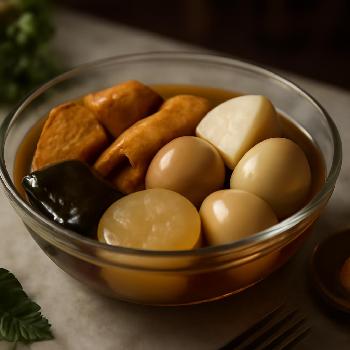International Cuisine > Japanese Cuisine > Soups & Stews (Japanese) > Oden Recipe
Classic Japanese Oden
A comforting and flavorful Japanese hot pot featuring a variety of simmered ingredients in a light, savory broth. Perfect for a cold evening!

Ingredients
- 200 g Daikon Radish
- 200 g Konnyaku (Konjac)
- 2 pieces Atsuage (Fried Tofu)
- 4 pieces Chikuwa (Fish Cake)
- 2 pieces Hanpen (Fish Cake)
- 4 Boiled Eggs
- 10 cm piece Kelp (Kombu)
- 2 tsp Dashi Powder
- 4 tbsp Soy Sauce
- 2 tbsp Mirin (Sweet Rice Wine)
- 1500 ml Water
- to taste Japanese Mustard (Karashi)
Preparing the Ingredients
Begin by preparing all the ingredients. Peel and cut the daikon radish into thick rounds. Score a cross pattern on one side of each round to help it cook evenly and absorb the flavor of the broth. Cut the konnyaku into triangles or rectangles and make a small slit in the center of each piece. Briefly boil the konnyaku for a few minutes to remove any bitterness. Prepare the atsuage by blanching it in hot water to remove excess oil. Cut the chikuwa and hanpen into halves or quarters, depending on their size.
Making the Dashi Broth
In a large pot, combine the water and kombu. Let it soak for at least 30 minutes (or preferably longer) to infuse the water with the kelp's flavor. If using, you can add dried shiitake mushrooms at this stage as well. After soaking, remove the kombu (you can optionally wipe it down and tie it into a knot for presentation). Bring the water to a simmer over medium heat. Add the dashi powder, soy sauce, and mirin. Stir well to combine.
Simmering the Oden
Once the broth is simmering, add the daikon radish. Since it takes the longest to cook, it goes in first. Simmer for about 20 minutes, or until the daikon is tender. Next, add the konnyaku, atsuage, and boiled eggs. Simmer for another 15 minutes. Finally, add the chikuwa and hanpen. Simmer for a final 10 minutes, or until all the ingredients are heated through and have absorbed the flavor of the broth. Be careful not to overcook the fish cakes, as they can become rubbery.
Serving the Oden
Serve the oden hot in individual bowls. Offer Japanese mustard (karashi) on the side for dipping. Each diner can choose their favorite ingredients from the pot. Enjoy the warm and flavorful oden!
Nutrition Facts Estimated per 100g of product
Note: These values are estimates and can vary based on specific ingredients used.
Calories: 50-70 kcal
Protein: 4-6g
Fat: 2-4g
Carbohydrates: 5-7g
Sodium: 200-400mg
Other Important Considerations for Nutrition
Oden can be relatively low in calories, but the sodium content can be high due to the soy sauce in the broth. If you are watching your sodium intake, you can use low-sodium soy sauce or dilute the broth with water. The protein content comes primarily from the fish cakes, tofu, and eggs. You can add other protein sources like chicken or beef to increase the protein content further. Consider the ingredients you add to Oden as these may impact overall nutrition.
FAQ
-
Can I use different ingredients in oden?
Yes! Oden is very customizable. You can add other ingredients like mochi kinchaku (fried tofu pouches filled with mochi), sausages, fish balls, or vegetables like carrots or mushrooms. Feel free to experiment and use your favorite ingredients. -
Can I make oden in a slow cooker?
Yes, you can make oden in a slow cooker. Simply combine all the ingredients in the slow cooker and cook on low for 4-6 hours, or until the daikon radish is tender. -
How long does oden keep in the refrigerator?
Oden can be stored in the refrigerator for up to 3 days. Reheat thoroughly before serving.
